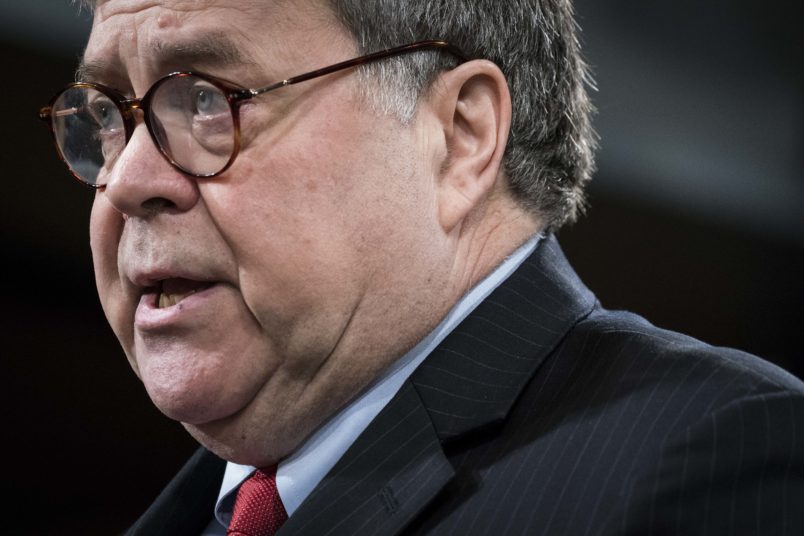
What the Justice Department said inside the courtroom Thursday at Stone’s sentencing hearing was in stark contrast with the chaos that’s swirled around the case outside the courthouse — chaos that’s been egged on by both President Trump and Attorney General Bill Barr.
John Crabb — the deputy chief of the D.C. U.S. Attorney’s office criminal division who jumped into the case after the trial team abruptly resigned last week — essentially backed the original sentencing proposal filed by the trial prosecutors that had been publicly overruled by Attorney General Barr. Crabb also vigorously praised both the prosecution and Judge Amy Berman Jackson, who have both been targets of Trump attacks on Twitter.
The trial team resigned from the case after the Justice Department, on Barr’s orders, watered down their initial sentencing recommendation for Stone. The reversal came just after Trump bashed the sentencing recommendation on Twitter and the President has continued to call the prosecution of Stone unfair.
But on Thursday, Crabb said the prosecution was “righteous” and stressed that even through the sentencing memo debacle, the prosecutors had acted only in “good faith.”
After the prosecutors filed their initial recommendation last week, the Justice Department told reporters the next day it was too harsh and that it was being clawed back. The trial team resigned from the case just as the Justice Department was filing a supplemental memo, with notably watered down language.
Berman Jackson made some pointed remarks about the whole situation, questioning Crabb on why he was the one handling the sentencing hearing Thursday, given that he knew less about the case than most of the people in the courtroom.
Crabb told Jackson that the trial team had gotten the appropriate sign off from U.S. Attorney Timothy Shea of Washington, D.C., and that the brouhaha was the result of a “miscommunication” between Shea and Barr. Crabb stressed the confusion was not the fault of the trial prosecutors.
That assertion was jarring considering that top DOJ officials had previously thrown the prosecutors under the bus for their original memo. Barr himself had complained that the “most junior level” people at the DOJ typically got to make the “life or death decisions” of sentencing.
Crabb wouldn’t say whether he wrote the supplemental Justice Department memo nor would he tell the judge whether he had been directed by someone else to write it. He told Berman Jackson that he was not “at liberty” to discuss those preparations.
But earlier in the hearing Crabb more or less walked back much of that second memo, by explicitly confirming that the DOJ was sticking with the major points made in the original memo.
The first part of the sentencing hearing was about the various “enhancements” the judge would apply in determining what the sentencing guidelines should be in Stone’s case. Enhancements are the aggravating factors that can increase the sentencing guidelines for a defendant.
(Once the guidelines are calculated, judges aren’t required to stick with them for their ultimate sentence, and Berman Jackson noted on Thursday that many judges and defense lawyers have long argued the U.S. Sentencing Commission guidelines are too harsh.)
Berman Jackson specifically brought up a line from the supplemental memo that said that enhancements proposed in the original memo were “perhaps technically applicable” but that they “disproportionately escalate the defendant’s sentencing exposure.”
She signaled she needed some clarification on that claim, and proceeded to discuss the individual enhancements. On several occasions she asked Crabb to confirm the Justice Department was sticking to what it originally proposed. Crabb never once said that the Justice Department no longer believed the original enhancement proposals applied.
This included the most controversial of the original DOJ-proposed enhancements, which was for the violent language that Stone used to threaten a potential witness in the House’s investigation.
The initial DOJ memo argued this enhancement applied, but the supplemental memo noted that if the judge did not apply it, it would lead to a sentence more in “line with the typical sentences imposed in obstruction cases.” The supplemental memo said that “it would be reasonable for the court to conclude that the guidelines range as calculated is unduly high on the facts of this case.”
On Thursday, when asked by Jackson, Crabb said, “Our position is that this enhancement applies.”
The judge also went over the enhancement the DOJ recommended for Stone’s post indictment behavior, which included posting to Instagram an image of the judge with a crosshairs above her shoulder as well as other violations of her gag order.
The supplemental memo cast doubt that the conduct actually prejudiced the jury, and the judge also brought up its language about there being an overlap with other proposed enhancements.
“I am not sure that I understand that assertion,” she told Crabb. Crabb clarified that the DOJ still believed the enhancement applied.
When he made his final remarks, Crabb had another opportunity to assert that the Justice Department was now recommending a lesser sentence than what was proposed in the first memo, but stopped short of explicitly doing so. Instead, Crabb expressed his “utmost confidence” in whatever the judge decided.
“Most importantly the court will rely on its own sound judgment and experience,” he said.
"back" - Google News
February 21, 2020 at 02:18AM
https://ift.tt/38OQRm0
DOJ Attorney Walks Back Bill Barr's Walk Back Of Stone Sentencing Memo - TPM
"back" - Google News
https://ift.tt/2QNOfxc
Shoes Man Tutorial
Pos News Update
Meme Update
Korean Entertainment News
Japan News Update
Bagikan Berita Ini















0 Response to "DOJ Attorney Walks Back Bill Barr's Walk Back Of Stone Sentencing Memo - TPM"
Post a Comment